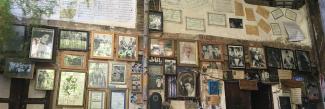
PhD students who matriculate in Summer 2020 and after will be guaranteed to have funding support from the University of Chicago, external sources, or a combination of the two for the duration of their program to include the following:
- Full tuition coverage
- Annual stipend
- Fully paid individual annual premiums for UChicago's student health insurance (U-SHIP, the University Student Health Insurance Plan)
- Student Services Fee (beginning in Autumn 2022)
A full list of tuition and fees and be found on the Office of the Bursar's website.
The goal of the University’s commitment to ensuring that students are supported is to allow students to prioritize their studies and prepare for rewarding careers. Funding is contingent on remaining in good academic standing and making progress toward completing degree requirements.
Additional fellowships and awards are available to support language study, conference travel, and research travel.
Teaching
Teaching is an essential part of graduate education at the University of Chicago. All MES students are required to teach as part of their funding package. This pedagogical experience is designed to serve as one element in the preparation of MES students for an academic career, along with advanced language study, research, and field work. Students are encouraged to take advantage of the considerable university resources devoted to improving teaching abilities and producing exceptional teaching portfolios.
Typically, students focus on coursework and language requirements during the first two years and complete the teaching requirements in years three through six.
Fellowships, Grants & Postdoctoral Opportunities
Once dissertation research is sufficiently advanced, students are expected to apply for dissertation fellowships to aid in completing their studies. Students are eligible to apply for a range of internal and external dissertation completion fellowships. Dissertation completion fellowships are commonly held in years seven or eight, but students may also hold a DCF in year six.
Students who hold a dissertation completion fellowship in year six and graduate no later than summer quarter of the sixth year are guaranteed appointment as a Humanities Teaching Fellow. The Humanities Teaching Fellowship is a two-year postdoctoral program designed to enhance pedagogical skills and extend research training. All MES students who graduate within seven years of matriculation are eligible to apply for this program.
In recent years our students have received support for dissertation writing and research, travel, and language study from the following sources:
- Mellon/ACLS Dissertation Completion Fellowship
- Franke Institute for the Humanities Dissertation Completion Fellowship
- Jacob Greenberg Dissertation Fellowship
- Oppenheim Dissertation Completion Fellowship
- Mellon Foundation–University of Chicago Dissertation Completion Fellowship
- Provost’s Dissertation Completion Fellowship
- SSRC International Dissertation Research Fellowship
- Fulbright-Hays DDRA (Doctoral Dissertation Research Award)
- Hanna Holborn Gray Fellowship
- Arnaldo Momigliano Dissertation Research travel grant
- Nicholson Center for British Studies Graduate Research Grants
- Foreign Language and Area Studies Fellowship (FLAS)
- Stuart Tave Teaching Fellowship
- Chicago Center for Jewish Studies Travel Grants
- Helen Rich Travel Fund
All students are encouraged to take advantage of the fellowship support resources available through UChicagoGrad. In addition to helping with research statements and CVs, UChicagoGrad manages many external fellowship programs, including the Fulbright programs, Foreign Language and Area Studies (FLAS), and DAAD grants, among others. They maintain an extensive fellowships database, and are available for individual meetings with students.
Fellowship announcements are distributed via the MES graduate student listserv.
Other Resources & Opportunities
Eligible students may work a limited number of hours per week on campus. Job opportunities include working in ISAC, University libraries, for the department as a Social Hour Coordinator, and for campus residential services. Advanced students who have fulfilled their department teaching requirements may also seek income from additional teaching opportunities, depending upon availability.
